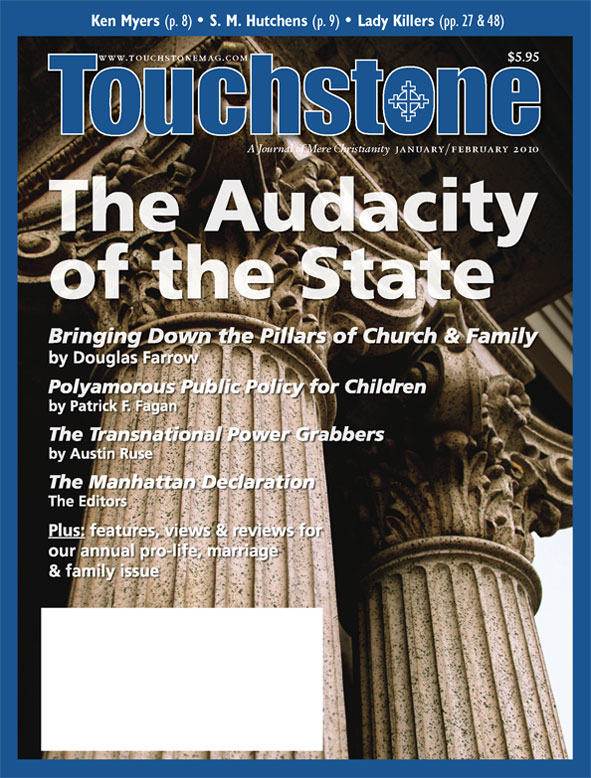Contradeception
Rebekah Curtis on the Public Nature of Marital Privacies
Our four ex utero kids are generally well-behaved, or so we’re told. But occasionally they do something spectacularly disobedient, and even more incredibly, they fail to make any serious effort to conceal it. This infuriates their father. If they’re going to do something that dumb, he growls, they should at least be clever enough to keep us from discovering them at their sin.
However, I salute their stupidity. I take it as a sign that though the children are disobedient, they have at least sinned simply and honestly. Their sin is impulsive, not deceptive; it is primarily of the flesh and not the devil. They sin with desire but without duplicity. They sin as I wish I sinned.
Their sin reminds me of a time when I would say of a couple of friends “in trouble,” “If you’re going to be stupid, at least be smart about it.” Their stupidity led to their exposure, their excruciating confessions to parents, their hurried marriages, the incongruity of birthdays and anniversaries in their family histories. At the time when I had such sophisticated advice to offer, it did not occur to me that this counsel amounted simply to adding deception to their sin.
Signs of Health or Brokenness
Sexual relationships, while enacted privately, are public property. The lover declares, “I am my beloved’s and my beloved is mine.” This protects the relationship from internal and external breach. Those within the relationship are bound to each other by their promise of troth, held in trust by the neutral third parties who witness the promise. Those outside the relationship know that this new unit of their community is being rightly founded, and also that any attempt to besiege the promise is illicit. The vow of complete self-giving is sanctioned by those present, and its publicity makes it safe to carry out. Thus would a bride in former times blush—all those gathered in her honor knew what she would be doing in just a few hours.
And in former times, when the married couple fulfilled their vows to God and each other and their witnesses, they produced, at God’s favor, babies to prove it. The lack of a baby indicated either a broken body or a broken vow. While both called for the community’s prayer, the latter also called for the community’s assistance in healing the marriage for the benefit of everyone, for a broken vow means broken people. When a baby gave evidence of a union where no vow had been made, it was similarly in the interest of the community to correct the situation in the way that would most benefit all the parties involved.
In marriage, a couple gives over supervision of their marital health to those who approved their avowal. A sexual relationship between people who made no vows would normally not remain a secret for long. But contraception blinds the community by concealing the sexual act outside of marriage, or its absence within marriage, and by leaving goods damaged in various ways unmarked as such.
The heartbroken suffer alone in hijacked bodies. A relationship is known to be serious (since sex is no longer a mark of gravity in a relationship) when both members unload the “baggage” of past relationships. Accountability is lost, and there is little opportunity for prevention. We are all left to pick up someone’s pieces when it is too late, and without help, since these matters are private.
This is not to advocate public shaming. The Church is not a place of shame, for Christ covered shame with his naked death. But the shame of sexual immorality torments even if it is not widely known.
Every member of the community profits from a protective mechanism against such shame. Two people cannot become one flesh without being personally affected, and the shock waves their union generates change the community. Publicizing the event allows the community to approve, prepare for, and absorb the change. Extramarital unions infect the community with diseases of body and soul. Atrophied unions weaken the community in body and soul. A community that has been deprived of its primary diagnostic tool for identifying an ill or illicit union is less able to remedy itself.
Rebekah Curtis is the co-author of LadyLike (Concordia, 2015), and her essays have appeared in Touchstone, Chronicles, Salvo, Modern Reformation, and Lutheran Forum, among other publications. She attends a congregation of the LCMS.
subscription options
Order
Print/Online Subscription

Get six issues (one year) of Touchstone PLUS full online access including pdf downloads for only $39.95. That's only $3.34 per month!
Order
Online Only
Subscription

Get a one-year full-access subscription to the Touchstone online archives for only $19.95. That's only $1.66 per month!
bulk subscriptions
Order Touchstone subscriptions in bulk and save $10 per sub! Each subscription includes 6 issues of Touchstone plus full online access to touchstonemag.com—including archives, videos, and pdf downloads of recent issues for only $29.95 each! Great for churches or study groups.
Transactions will be processed on a secure server.
more from the online archives
calling all readers
Please Donate
"There are magazines worth reading but few worth saving . . . Touchstone is just such a magazine."
—Alice von Hildebrand
"Here we do not concede one square millimeter of territory to falsehood, folly, contemporary sentimentality, or fashion. We speak the truth, and let God be our judge. . . . Touchstone is the one committedly Christian conservative journal."
—Anthony Esolen, Touchstone senior editor










